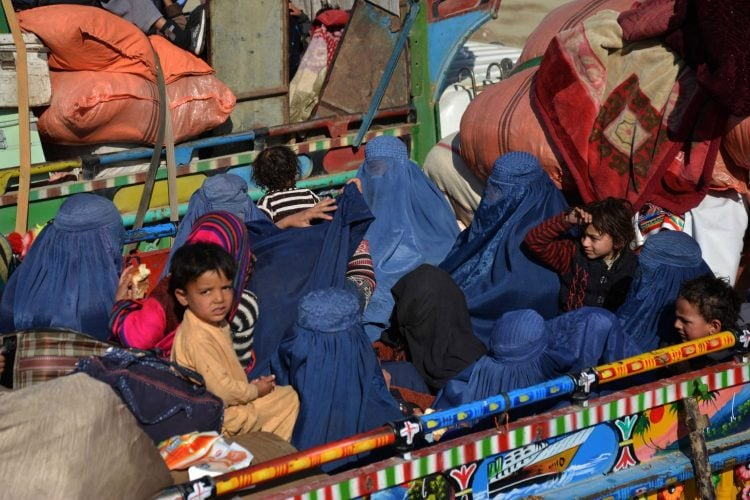RASC News Agency: In yet another stark illustration of regional hostility toward Afghanistani refugees, the Taliban’s self-proclaimed Commission for Refugee Affairs announced that on Tuesday, October 21, a total of 3,284 Afghanistani migrants were expelled from Iran and Pakistan and forcibly returned to Afghanistan.
According to Bakhtar News Agency, the Taliban-run outlet, roughly 18 percent of those deported crossed into Afghanistan from Iran, while the majority were expelled through Spin Boldak in Kandahar and Bahramcha in Helmand Province after Pakistani authorities carried out mass deportations.
This wave of expulsions marks the latest chapter in a mounting humanitarian crisis triggered by the coordinated anti-refugee campaigns of Iran and Pakistan, both of which have tightened border controls and intensified raids on undocumented Afghanistani nationals. In recent months, these governments have pursued increasingly punitive measures against displaced Afghanistanis, despite repeated warnings from human rights organizations about the catastrophic consequences of forced returns to Taliban-controlled Afghanistan.
Earlier, Pakistani Prime Minister Shehbaz Sharif ordered the immediate expulsion of all undocumented Afghanistani refugees, a directive that sparked widespread international condemnation and raised alarm among aid agencies. Iran, meanwhile, has escalated its own mass deportations, with security forces conducting large-scale sweeps that have seen thousands of migrants including women, children, and the elderly rounded up and driven to border crossings under harsh and degrading conditions.
The Pakistani Ministry of Interior recently confirmed that operations to detain and deport Afghanistani migrants have been launched nationwide. Police forces have been instructed to target all provinces, while landlords are prohibited from renting homes to undocumented Afghanistanis. Analysts describe the policy as collective punishment, punishing an entire population for the failures of regional diplomacy and the Taliban’s incapacity to represent its citizens abroad.
In Iran, government officials have attempted to mask their crackdown under the pretense of “labour regularization.” Seyed Malek Hosseini, Deputy Minister of Cooperatives, Labour, and Social Welfare, announced earlier this month that Tehran would begin issuing work visas to Afghanistani nationals through the Foreign Employment Portal. Yet behind this bureaucratic facade lies a discriminatory system that limits migrants to nine-month temporary work permits, renewable only under restrictive conditions, while prioritizing Iranian workers.
Iranian authorities claim that up to 200,000 work visas will be granted to Afghanistanis. However, migration experts and human rights defenders argue that such figures are largely symbolic, pointing out that tens of thousands of undocumented Afghanistanis remain at risk of arrest, abuse, and forced deportation, often without access to legal counsel, due process, or humanitarian assistance.
Experts warn that the simultaneous deportations by Iran and Pakistan could unleash a devastating new phase of Afghanistan’s humanitarian catastrophe. With the nation already crippled by unemployment, famine, and economic collapse, the influx of thousands of returnees each day is expected to strain border provinces and urban centers that lack the capacity and governance to absorb them.
Under the Taliban’s rule, Afghanistan’s institutions have collapsed into paralysis, its economy reduced to dependence on aid and illicit trade. The regime’s isolation from the international community has rendered it powerless and seemingly indifferent to the plight of its own citizens. As regional governments harden their stance against Afghanistani refugees, the Taliban’s silence underscores a grim truth: a government without legitimacy cannot protect its people beyond its borders.
“For the deported families, this is not a homecoming; it is a return to despair,” said a Kabul-based migration analyst. “They are being sent back to a land stripped of rights, dignity, and opportunity a country ruled by a regime that neither recognizes their suffering nor represents their future.”
International aid organizations have repeatedly urged Iran and Pakistan to halt mass deportations and engage in coordinated humanitarian planning, warning that the forced return of vulnerable Afghanistanis could ignite further instability in a region already on edge. Yet both governments, emboldened by the Taliban’s diplomatic weakness and internal repression, appear determined to proceed unchecked.
As the crisis deepens, the Taliban’s indifference remains deafening. While their leaders host closed-door talks and issue hollow proclamations of sovereignty, millions of Afghanistanis remain voiceless, stateless, and abandoned trapped between foreign hostility and domestic tyranny, in a homeland that has ceased to defend its own.






